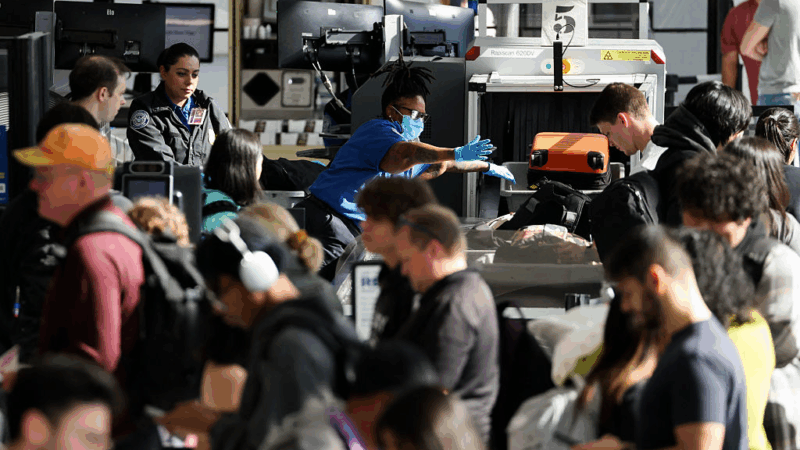Illinois sues the Trump administration to block National Guard deployment, joining Oregon
The state of Illinois and the city of Chicago have filed a federal lawsuit against the Trump administration over its effort to deploy National Guard troops to the state, a day after a federal judge blocked any federalized Guard members from deploying to Oregon.
Illinois and Chicago are asking a judge to block the Trump administration from federalizing the Illinois National Guard and from sending to Illinois any guard members from other states, including Texas.
“The American people, regardless of where they reside, should not live under the threat of occupation by the United States military, particularly not simply because their city or state leadership has fallen out of a president’s favor,” Illinois Attorney General Kwame Raoul wrote in the complaint.
It’s the latest turn in a dizzying three-day saga that saw the Trump administration order the federalization of National Guard troops in Illinois and Oregon as well as dispatch Guard members there from other states.
President Trump has for weeks promised to send National Guard members to Chicago and Portland, cities he’s characterized as overrun with crime and in need of federal law enforcement help. The administration has also said the troops will be used to protect federal immigration agents and federal property.

Local and state leaders in Illinois and Oregon have said National Guard troops are not needed and that Trump is abusing his power. Violent crime is at a low point in Chicago, along with other cities Trump has threatened with National Guard deployments.
Oregon Gov. Tina Kotek said on Sunday night that Trump’s “actions are an effort to occupy and incite cities and states that don’t share his politics, and I believe that we should expect him to continue to push the limits of his authority.”
The Trump administration’s attempts to deploy the National Guard into the two Democratic-run cities come after it sent guard members into Los Angeles and Washington, D.C., earlier this year.
Here are the latest updates.
Chicago sues Trump as it braces for troops
The lawsuit filed Monday argues that the Trump administration can only federalize a state’s National Guard in cases of invasion, rebellion or if the federal government cannot enforce federal laws — and that none of those circumstances exist.
Over the weekend, Trump authorized the deployment of at least 300 members of the Illinois National Guard. A Pentagon memo viewed by NPR suggested the troops would be used to protect federal property as well as U.S. Immigration and Customs Enforcement and Federal Protective Service agents and other federal employees.
Additionally, Texas Gov. Greg Abbott said he had approved Trump’s request to call up 400 members of the Texas National Guard, with some of them slated to go to Illinois.
Illinois Gov. JB Pritzker, a Democrat who has clashed with Trump, blasted the administration’s actions over the weekend.
“We must now start calling this what it is: Trump’s Invasion,” Pritzker said in a post on X. “It started with federal agents, it will soon include deploying federalized members of the Illinois National Guard against our wishes, and it will now involve sending in another state’s military troops.”
On Saturday, White House spokesperson Abigail Jackson said in a statement that Trump had federalized the Illinois National Guard troops “[a]midst ongoing violent riots and lawlessness” in Chicago in order to “protect federal officers and assets,” WBEZ reported.
A judge blocks the National Guard deployment in Oregon
In Oregon, a federal judge late Sunday evening temporarily blocked the Trump administration from sending National Guard members from any other states to Oregon.
The ruling was in response to news that Trump had dispatched members of the California National Guard to Oregon and had also gotten approval from Texas to do the same.

Oregon and Portland — along with the state of California — went to court and asked U.S. District Judge Karin J. Immergut to block the move. It was one day after she had temporarily blocked Trump from federalizing the Oregon National Guard.
“I am certainly troubled by now hearing that both California and Texas are being sent to Oregon, which does appear to be in direct contradiction of my order,” Immergut, who was appointed to the federal bench by Trump in 2019, wrote in her order, Oregon Public Broadcasting reported.
Oregon Attorney General Dan Rayfield praised the judge’s ruling Sunday night. “The president can’t keep playing whack-a-mole w/ different states’ Guard units to get around court orders & the rule of law,” he wrote on X.
White House Press Secretary Karoline Leavitt said in a press briefing Monday afternoon that the administration was appealing the decision, and that the ICE facility there had been “under siege” by protesters.
“These people are not there to peacefully protest,” she said. “They are there to cause mayhem and havoc.”
One day earlier, Immergut ruled that the Trump administration hadn’t met the threshold for declaring that recent protests outside a Portland ICE facility constituted a rebellion, saying those demonstrations have generally been fewer than 30 people and “largely sedate.”
The Trump administration had federalized 200 members of the Oregon National Guard the previous Sunday, according to a memo sent to Kotek from the Department of Defense.
Trump said after the judge’s initial ruling that he hadn’t seen the order blocking the federalization of the Oregon National Guard, but that “that judge ought to be ashamed of themselves.”
Travel industry pushes Congress to end DHS shutdown and pay federal security workers
With the busy spring break travel season looming, travel and aviation industry leaders urged Congress to end the stalemate over DHS funding before workers at TSA and ports miss a full paycheck.
Trump fires Kristi Noem as DHS chief, names Sen. Markwayne Mullin to replace her
President Trump has fired his homeland security secretary, Kristi Noem, and said Markwayne Mullin, a senator from Oklahoma, would replace her.
They were led off course in a big race. But a fix is more complicated than prize money
Top finishers in the Atlanta half marathon are calling for U.S. track officials to ensure that Jess McClain and two other athletes aren't excluded from the world championships because of an error.
No matter what happens at the Oscars, Delroy Lindo embraces ‘the joy of this moment’
Lindo is nominated for best supporting actor for his role in Sinners. At the BAFTA awards on Sunday, Lindo was presenting when a man with Tourette syndrome in the audience yelled out a racial slur.
Between Megan Moroney and Ella Langley, country women rule the charts
It's a big week for women in country music — and, it turns out, for women whose songs are favored by women in figure skating.
A Jan. 6 rioter pardoned by Trump was sentenced to life in prison for child sex abuse
Since receiving presidential pardons, dozens of former Capitol rioters have gotten into more legal trouble. In Florida, Andrew Paul Johnson was sentenced to life in prison for child sex abuse.








